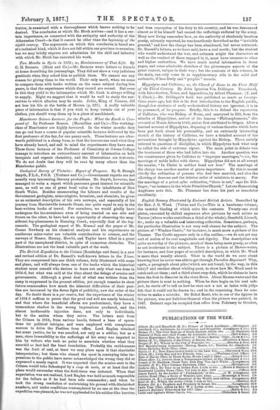Hippolytus and Ca/hates; or, the Church of Rome in the
First Half of the Third C'entwy. By John Ignatius Von Dollinger. Translated, with Introduction, Notes, and Appendices, by Alfred Plummer. (T. and T. Clark.)—Dr. Dollinger's book was published as much as twenty- three years ago, but this is its first introduction to the English public, though few students of early ecclesiastical history are ignorant, it is to be presumed, of its purpose. Briefly, this is to defend the reputation of Callistus, who was Bishop of Rome, and martyred in 223, from the attacks of Hippolytus, author of the famous "Philosophumena," dis- covered at Mount Athos in 1842, and at first attributed to Origen. After a learned account of Hippolytus, disposing of various theories which have been put forth about his personality, and an extremely interesting sketch of the history of Callistus, we have a detailed account of the accusations brought by Hippolytus against the Bishop. These mainly referred to questions of discipline, in which Hippolytus took what may be called the side of extreme rigour. The main point in debate was the treatment of those who had fallen into sin. Another question was the countenance given by Callistus to "improper marriages,"—i.e., the marriage of noble ladies with slaves. Hippolytus did not at all accept the maxim, "In Christ is neither bond nor free." The marriage of the clergy was another matter of grave importance. By this is meant chiefly the ordination of persons who had been married, and also the allowing of deacons and the inferior order of ministers to marry. For the marriage of a priest after ordination, "there is not," says Dr. Dol. linger, "an instance in the whole Primitive Church." Let our Romanising Anglicans note this. Mr. Plummer has done his part as translator excellently. -






































 Previous page
Previous page